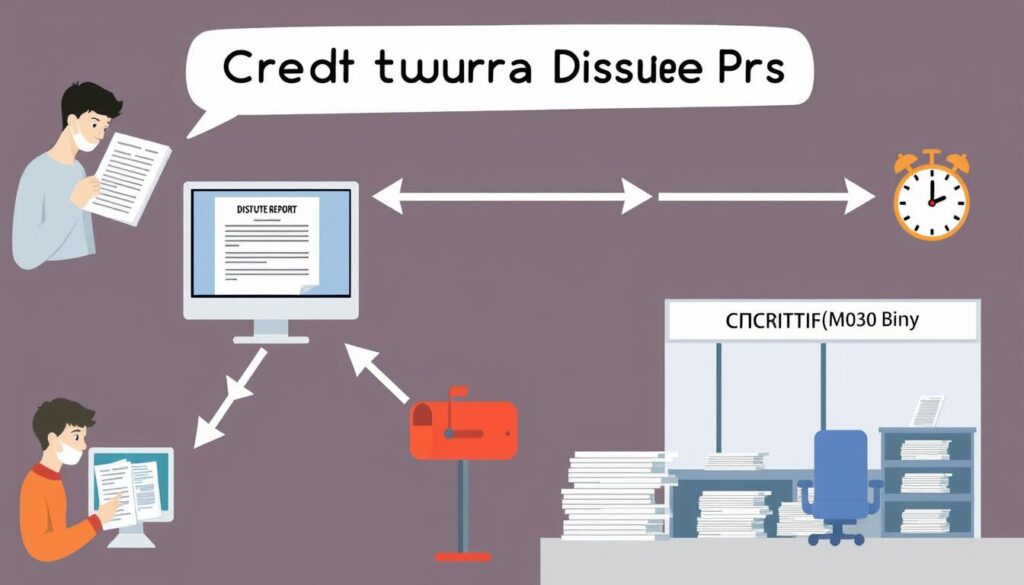A good credit score is vital for loans, housing, and job opportunities. Inaccurate credit report info can harm your creditworthiness. The Fair Credit Reporting Act (FCRA) helps you fix errors on your credit reports.
This guide will show you how to send an FCRA free dispute letter. You’ll learn to take charge of your credit and boost your financial health.
Key Takeaways
- The FCRA protects consumers from inaccurate credit reporting and provides a mechanism to dispute errors.
- Identifying and addressing errors on your credit report can lead to a significant improvement in your credit score.
- An FCRA free dispute letter is a powerful tool to initiate the credit bureau’s investigation process and correct inaccurate information.
- Understand your rights and responsibilities under the FCRA to ensure credit bureaus and creditors comply with the law.
- Regularly monitoring your credit reports and disputing any errors is crucial for maintaining a healthy credit profile.
Understanding the Fair Credit Reporting Act (FCRA)
The Fair Credit Reporting Act (FCRA) protects consumer rights and ensures accurate credit information. This federal law outlines rights and responsibilities for consumers and credit bureaus. It creates a framework for fair credit reporting practices.
Rights and Protections Afforded to Consumers
The FCRA grants consumers various rights to safeguard their credit information. These include accessing credit reports and disputing inaccurate or incomplete information. Consumers can also receive notice of adverse actions based on their credit reports.
The FCRA limits information types in credit files. It sets strict guidelines for reporting and using this information.
Responsibilities of Credit Bureaus and Creditors
Credit bureaus must verify the accuracy of collected information. Creditors must report information accurately and promptly investigate errors identified by consumers. These responsibilities ensure fair and accurate reporting of consumer credit information.
| Key FCRA Provisions | Consumer Rights | Bureau/Creditor Responsibilities |
|---|---|---|
| Right to access credit reports | ✓ | Ensure accurate reporting |
| Right to dispute inaccuracies | ✓ | Investigate disputes promptly |
| Limits on information inclusion | ✓ | Comply with FCRA guidelines |
| Notice of adverse actions | ✓ | Provide required notices |
Understanding FCRA’s key provisions helps consumers navigate the credit reporting landscape. It allows them to protect their consumer rights. Consumers can take steps to ensure fair credit reporting act compliance.
The Importance of Disputing Inaccurate Credit Information
A healthy credit profile is vital for your financial well-being. Inaccurate information on your credit report can harm your credit score. Disputing errors is crucial for maintaining your credit history’s integrity.
Inaccurate credit information can appear as incorrect account details or erroneous payment histories. It can even include fraudulent activities. These errors can lower your credit score if left unresolved.
A lower score makes it harder to get loans, credit cards, or secure housing. It can even affect your employment prospects. By disputing credit report disputes, you can fix inaccurate credit information.
This process helps improve your credit score improvement. It also ensures your credit report accurately reflects your creditworthiness. Taking control of your financial future becomes easier.
| Potential Impact of Inaccurate Credit Information | Benefits of Disputing Errors |
|---|---|
|
|
Reviewing your credit report is essential. Dispute any inaccurate credit information you find. This ensures your credit profile accurately reflects your financial history.
A proactive approach can lead to credit score improvement. It can open up new financial possibilities for you.
“Disputing errors on your credit report is one of the most effective ways to improve your credit score and financial well-being.”
Addressing credit report disputes might seem challenging at first. But with the right guidance and tools, you can navigate the process confidently.
In the next section, we’ll explore steps to identify and address credit report inaccuracies.
When to Send an FCRA Free Dispute Letter
The Fair Credit Reporting Act (FCRA) gives you the right to dispute inaccurate credit information. If you spot errors on your credit report, act fast. Send an FCRA free dispute letter to the credit bureaus right away.
Errors can include wrong account details, false missed payments, or fraud. These mistakes can hurt your credit score and financial health.
Identifying Errors on Your Credit Report
Check your credit report often to keep your credit info accurate. Look closely for any fcra free dispute letter, credit report disputes, or inaccurate credit information that need fixing.
Common issues to watch for include:
- Accounts that do not belong to you
- Incorrect account balances or credit limits
- Missed payments or delinquencies that are not accurate
- Fraudulent activities, such as identity theft or unauthorized accounts
Finding these errors is key to protecting your credit score. It ensures your financial history is shown fairly and accurately.
“Monitoring your credit report regularly and disputing any inaccuracies is an essential step in maintaining a healthy credit profile.”
| Reason to Dispute | Potential Impact |
|---|---|
| Incorrect account information | Can negatively affect your credit score |
| Fraudulent or unauthorized accounts | Can be a sign of identity theft and require immediate action |
| Missed or late payments that are not accurate | Can lower your credit score and impact your creditworthiness |
Preparing the FCRA Free Dispute Letter
An effective fcra free dispute letter is key to fixing credit report errors. Your letter should be well-structured and persuasive. Include important elements to make your case strong.
Essential Information to Include
When writing credit repair letters, include these important details:
- Your personal information: Full name, address, and date of birth.
- The specific item(s) you’re disputing on your credit report, including the account number (if applicable) and the date the item(s) appeared.
- A clear explanation of why the item(s) is inaccurate, misleading, or incomplete, along with any supporting documentation you can provide.
- A request for the credit bureau to investigate the disputed item(s) and provide you with a written response within the legally required timeframe.
- Your signature and the date you’re submitting the letter.
These elements create a strong section 609 dispute. They outline issues with your credit report clearly. They also state your rights under the Fair Credit Reporting Act (FCRA).

A well-crafted debt validation letter can help improve your credit. It’s a powerful tool for reclaiming your financial well-being. Take time to make your dispute letter thorough and convincing.
FCRA Free Dispute Letter
An FCRA free dispute letter can help fix errors on your credit report. This powerful tool is based on the Fair Credit Reporting Act (FCRA). It allows you to challenge inaccurate information and request its removal.
To write an effective letter, start by reviewing your credit report carefully. Identify the specific items you want to dispute. These could include incorrect account information, erroneous public records, or mistaken identity issues.
Gather supporting documents to back up your claims. This may include bank statements, billing records, or correspondence with creditors. Having solid evidence strengthens your case and proves your dispute is valid.
When writing the letter, include these key elements:
- Your full name, address, and other contact information
- A clear identification of the specific items you are disputing on your credit report
- A concise explanation of why the information is inaccurate, with supporting evidence
- A request for the credit bureau to investigate the disputed items and remove any erroneous information
- A statement asserting your rights under the FCRA, including the section 609 dispute provision
A well-crafted FCRA free dispute letter can help improve your credit score. It’s a proactive step towards improving your credit repair and protecting your financial future. Be thorough, precise, and persistent in your efforts.
“Vigilantly monitoring your credit report and promptly addressing any inaccuracies is a crucial aspect of maintaining a healthy financial profile.”
Submitting the Dispute Letter
It’s time to submit your FCRA free dispute letter to the credit bureau(s). Your delivery method can impact the process’s timeliness and effectiveness. Let’s look at the most common options for consumers.
Choosing the Right Method of Delivery
You have several options for submitting your FCRA free dispute letter:
- By mail: Send your dispute letter via certified mail with return receipt requested to ensure it is received and documented.
- Online: Many credit bureaus offer secure online dispute portals where you can submit your letter electronically.
- In person: Some credit bureaus have local offices where you can hand-deliver your dispute letter and receive a receipt.
Keep detailed records of your dispute, no matter which method you choose. Include the submission date, confirmation numbers, and any responses from the credit bureau.
| Delivery Method | Advantages | Disadvantages |
|---|---|---|
|
| |
| Online |
|
|
| In Person |
|
|
Consider the pros and cons of each delivery method for your FCRA free dispute letter. Think about what works best for your situation.
Keeping accurate records is crucial for a successful resolution. Follow up on your dispute to ensure a timely outcome.

Follow-Up and Next Steps
After sending your FCRA free dispute letter, follow up with the credit bureaus. Monitor your dispute status closely. This ensures thorough investigation and removal of inaccurate information from your credit report.
The Fair Credit Reporting Act (FCRA) protects your consumer rights. Stay proactive to safeguard your financial reputation.
Here are the key steps to take after filing your credit bureau dispute:
- Track the Dispute Status: Check your dispute status regularly with the credit bureaus. Use their online portals or contact customer service to stay informed.
- Review the Investigation Results: Examine the results carefully once the investigation is complete. Verify that your credit report reflects any corrections or removals.
- Follow Up on Incomplete Investigations: If issues remain unresolved, you can dispute the investigation results. Request a re-investigation through the credit bureau dispute process.
Stay vigilant throughout the credit bureau dispute process. This protects your consumer rights and ensures an accurate credit report.
An accurate credit report supports your efforts to maintain and improve your credit score.
“Monitoring your credit report and addressing inaccuracies promptly is crucial. It maintains a healthy credit profile and upholds your FCRA rights.”
Credit Repair and Improving Your Credit Score
Disputing wrong credit info is crucial, but good credit requires long-term effort. Try these strategies to boost your score and gain financial stability:
Responsible Credit Usage
- Keep credit card balances low, aiming for a credit utilization ratio of less than 30%.
- Avoid opening too many new credit accounts at once, as this can negatively impact your credit score.
- Utilize a mix of different credit types, such as credit cards, loans, and mortgages, to demonstrate your ability to manage various forms of credit.
Payment History Management
- Make all your payments on time, even if it’s just the minimum amount due. Payment history is the most significant factor in your credit score.
- Set up automatic payments or payment reminders to avoid late or missed payments.
- If you’ve had past late payments, work on gradually improving your payment history over time.
Credit Monitoring and Reporting
Check your credit reports often to spot and fix issues quickly. Sign up for a credit monitoring service or set reminders to review your reports yearly.
| Credit Repair Strategies | Impact on Credit Score |
|---|---|
| Disputing Inaccurate Information | Significant positive impact |
| Responsible Credit Usage | Moderate positive impact |
| Timely Payments | Substantial positive impact |
| Credit Monitoring | Indirect positive impact |
Dispute errors, use credit wisely, and pay on time. Monitor your credit regularly. These steps will help improve your score and financial health.

“Achieving a good credit score is a marathon, not a sprint. Consistency and diligence are key to building and maintaining a strong credit history.”
Understanding Credit Bureau Dispute Processes
Credit report accuracy is crucial for your financial health. The Fair Credit Reporting Act (FCRA) requires credit bureaus to investigate disputes. They must correct any inaccurate or incomplete information on your credit file.
Understanding this process ensures your FCRA free dispute letter is handled efficiently. It helps you protect your rights and maintain an accurate credit report.
The credit bureau dispute process typically involves the following steps:
- Submitting a dispute: You can submit a dispute directly to the credit bureau either online, by mail, or over the phone. Be sure to provide detailed information about the error and any supporting documentation.
- Investigation: The credit bureau will then conduct an investigation, which may involve contacting the creditor or lender that provided the disputed information.
- Resolution: If the investigation finds the information is inaccurate or incomplete, the credit bureau must correct or delete the item from your credit report. If the information is found to be accurate, the credit bureau will maintain the item on your report.
- Notification: The credit bureau will provide you with the results of the investigation, typically within 30-45 days.
Credit bureaus must comply with the FCRA. They’re required to ensure the credit information they maintain is accurate. This process helps you navigate the system effectively.
| Credit Bureau | Dispute Process | FCRA Compliance |
|---|---|---|
| Experian | Online, by mail, or by phone | Investigates disputes and corrects inaccurate information |
| Equifax | Online, by mail, or by phone | Investigates disputes and corrects inaccurate information |
| TransUnion | Online, by mail, or by phone | Investigates disputes and corrects inaccurate information |
Knowing your rights under the FCRA empowers you. You can actively maintain your credit report’s accuracy. This knowledge helps improve your overall credit health.
Consumer Rights and Debt Validation
The Fair Credit Reporting Act (FCRA) protects your financial well-being. It gives you the right to dispute wrong information on your credit report. The FCRA also allows you to request debt validation.
Exercising Your Rights Under the FCRA
Understanding your consumer rights is crucial for fair credit reporting act compliance. A debt validation letter can make creditors provide proof of reported debt. This helps fix consumer rights protection issues and improves credit report accuracy.
Check your credit reports from Experian, Equifax, and TransUnion regularly. If you find errors, start a dispute with a detailed FCRA free dispute letter. Send this to the relevant credit bureau(s).
| Key Consumer Rights Under the FCRA | Description |
|---|---|
| Right to Dispute Inaccuracies | Consumers can dispute any inaccurate, incomplete, or unverifiable information on their credit reports. |
| Right to Debt Validation | Consumers can request that creditors provide evidence of the debt they are reporting, known as debt validation. |
| Right to Free Annual Credit Reports | Consumers are entitled to a free copy of their credit report from each of the three major credit bureaus annually. |
Knowing your consumer rights protection helps you manage your credit profile better. This ensures its accuracy and improves fair credit reporting act compliance. It can lead to better financial opportunities.

Working with Credit Repair Companies
Feeling swamped by credit disputes? A credit repair company might be your answer. These experts know the Fair Credit Reporting Act inside out. They can help boost your credit score by challenging errors on your report.
These firms excel when you have many negative items. They’re also great if your own disputes haven’t worked. Their know-how helps them talk effectively with credit bureaus and creditors.
Choosing a credit repair company? Do your homework. Look for a proven success record and fair pricing. Avoid those making wild promises or charging huge upfront fees.
| Benefit | Description |
|---|---|
| Expertise | Credit repair companies have a deep understanding of the FCRA and the dispute process, which can be invaluable for individuals who are unfamiliar with the system. |
| Time-Saving | Working with a credit repair company can save you time and effort, as they handle the tedious tasks of gathering documentation, drafting credit repair letters, and communicating with credit bureaus on your behalf. |
| Improved Results | Credit repair companies often have established relationships with credit bureaus and creditors, which can lead to more successful dispute outcomes and credit score improvement. |
Credit repair companies can be helpful, but remember your rights. You can dispute errors directly with credit bureaus yourself. Your choice depends on your situation, preferences, and resources.
Preventing Future Credit Report Errors
Keeping your credit information accurate is vital for your financial health. Regular monitoring helps catch and fix errors quickly. This protects your credit score and overall financial well-being.
Monitoring Your Credit Reports Regularly
Frequent credit report checks help spot credit report disputes or inaccurate credit information early. Quick action can correct errors before they harm your credit score improvement.
Regular reviews ensure your credit history accurately reflects your financial status. This vigilance allows you to maintain control over your credit information.
- Obtain a free copy of your credit report from each of the three major credit bureaus (Experian, Equifax, and TransUnion) at least once a year.
- Review your credit reports thoroughly, checking for any errors, outdated information, or suspicious activity.
- If you identify any discrepancies, initiate a dispute with the appropriate credit bureau to have the information corrected.
Staying on top of your credit reports helps safeguard your financial future. It lets you take swift action when needed.
| Credit Bureau | Website | Dispute Process |
|---|---|---|
| Experian | Experian.com | Online, by mail, or by phone |
| Equifax | Equifax.com | Online, by mail, or by phone |
| TransUnion | TransUnion.com | Online, by mail, or by phone |
Regular credit report checks are key to preventing future errors. Addressing issues promptly helps maintain a healthy credit profile. This proactive approach keeps your financial record accurate and up-to-date.
Additional Resources and Support
Need help with fair credit reporting act compliance, consumer rights protection, or credit score improvement? Various resources and support services are available. These include government agencies, consumer advocacy groups, and financial education programs.
The Federal Trade Commission (FTC) and Consumer Financial Protection Bureau (CFPB) offer guidance on consumer rights. They provide information about the Fair Credit Reporting Act (FCRA) and help with credit disputes.
Nonprofit organizations also offer support for credit-related issues. The National Consumer Law Center and National Association of Consumer Advocates can help. They provide advice, assistance with disputes, and legal service referrals if needed.

